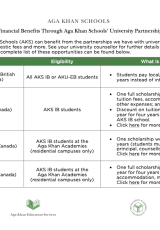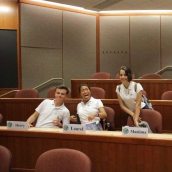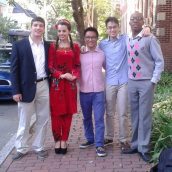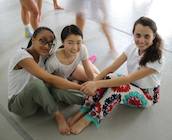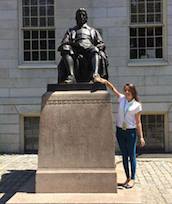Taking the global to the local: Muslima’s experience at the Global Citizens Youth Summit
One requirement of the summit was for the participants to come up with a project that could be implemented in their local environments. Muslima chose the umbrella of poverty, and worked with students from Jordan, Spain and the US to tackle this. The outcome of her experience influenced her to start the YOUTHeory project, which aims at tackling the problem of poverty at a local level.
Muslima poses with some of the other participants at the summitMotivated and inspired by a deep passion for development and education, her project is centred on promoting education and sustainable development. Her focus is not only on the education, but on its quality too. From her observations in her home in Tajikistan, Muslima has noted how despite a high literacy rate, the population struggles to translate their education into something applicable.It is with idea in mind that her project aims at tutoring young students at the Kengeleni Primary School in Kongowea, one of the most impoverished areas in Mombasa. Besides trying to mobilise aid for them through donation drives, she has also made use of the contacts she made during the summit, and is currently working on a fundraiser in Spain through her colleague. She has been thorough in performing an investigation on the needs of the school, which consists of both a nursery and primary school with a combined population of 1,277 students and only 27 teachers. Furthermore, she identified key sectors that required attention: the absence of creative subjects that celebrate the arts, torn uniforms, the lack of adequate learning space as the classrooms are relatively small, lack of stationery and dirty drinking water as a consequence of a borehole malfunction.
Muslima spends some time bonding with students from all over the worldBy interacting with the staff and students alike, she hopes to achieve a sustainable form of development that reduces dependency and fosters growth. She has rigorously applied the learning outcomes from the summit, to the extent of collaborating with new friends who embody the same vision of her YOUTHeory project. In addition, Muslima has already conducted one session at Kengeleni Primary School to establish a bond with the students and to talk about the way forward. Keeping in mind the sustainability of the project, she has also recruited nine other students from the Academy from a range of year groups in order to facilitate the tutoring sessions, and to ensure the continuity of her project even after she graduates. Muslima with the statue of John HarvardThe Academies place emphasis on the virtuous qualities of leadership and critical thinking, which Muslima believes had adequately prepared her for the topics she covered at the summit. The summit became a gateway for her to heighten her knowledge on leadership and the interaction with individuals who held similar interests to hers. “I have never been able to travel without always being near people related to me in some way. This summit made me feel like I was a part of something bigger than just what I thought I was,” she reflects. Hearing the stories about poverty in her peers’ contexts motivated her to implement their theories, as the realisation of the universality of poverty became more and more evident. “You know the cliché we keep being told to ‘change the world’? This summit helped us realise that we actually 'can' change the world.” Muslima’s project may become a stepping stone in realising the importance of sustainable development, and its impact could have a lasting, positive effect on the community at Kengeleni Primary School.Click here to read an account of last year's summit.
By Lilian Odera and Sarra Sheikh
Newsletter readers please click here to return to the newsletter (browser version)
publications
